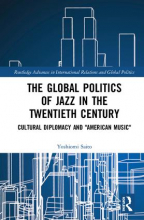From the mid-1950s to the late 1970s, jazz was harnessed as America’s "sonic weapon" to promote an image to the world of a free and democratic America. Dizzy Gillespie, Dave Brubeck, Duke Ellington and other well-known jazz musicians were sent around the world – including to an array of Communist countries – as "jazz ambassadors" in order to mitigate the negative image associated with domestic racial problems. While many non-Americans embraced the Americanism behind this jazz diplomacy without question, others criticized American domestic and foreign policies while still appreciating jazz – thus jazz, despite its popularity, also became a medium for expressing anti-Americanism. This book examines the development of jazz outside America, including across diverse historical periods and geographies – shedding light on the effectiveness of jazz as an instrument of state power within a global political context.
Saito examines jazz across a wide range of regions, including America, Europe, Japan and Communist countries. His research also draws heavily upon a variety of sources, primary as well as secondary, which are accessible in these diverse countries: all had their unique and culturally specific domestic jazz scenes, but also interacted with each other in an interesting dimension of early globalization. This comparative analysis on the range of unique jazz scenes and cultures offers a detailed understanding as to how jazz has been interpreted in various ways, according to the changing contexts of politics and society around it, often providing a basis for criticizing America itself. Furthering our appreciation of the organic relationship between jazz and global politics, Saito reconsiders the uniqueness of jazz as an exclusively "American music."
This book will be of interest to students and scholars of international relations, the history of popular music, and global politics.
1. The Genealogy of ‘American Music’
2. The Scene Changes in Postwar Jazz Politics
3. Jazz Ambassadors Revisited
4. The Politics behind the Selection Process
5. Anti-Americanism in the Western Jazz Discourse
6. Containing the Soviet Jazz Scene
7. Contesting Discourses in East European Jazz Scenes
8. Making Jazz Great Again
(The cover image, the outline and the table of contents are quoted with the consent of the publisher.)


